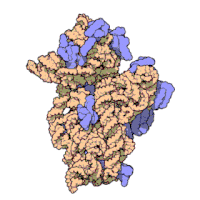
Structural diversity and flexibility of diabodies.
Sign Up to like & getrecommendations! Published in 2019 at "Methods"
DOI: 10.1016/j.ymeth.2018.09.005
Abstract: Diabodies are bispecific antibody fragments that have two antigen binding Fv domains. They are unique among hundreds of different formats of bispecific antibodies because they are small and rigid enough to be crystallized. Diabodies are… read more here.
Keywords: diversity flexibility; structural diversity; flexibility diabodies; flexibility ... See more keywords

Reconciliation between operational taxonomic units and species boundaries
Sign Up to like & getrecommendations! Published in 2017 at "FEMS Microbiology Ecology"
DOI: 10.1093/femsec/fix029
Abstract: Abstract The development of high-throughput sequencing technologies has revolutionised the field of microbial ecology via 16S rRNA gene amplicon sequencing approaches. Clustering those amplicon sequencing reads into operational taxonomic units (OTUs) using a fixed cut-off… read more here.
Keywords: reconciliation operational; operational taxonomic; units species; taxonomic units ... See more keywords

Variable regions of the glyS, infB and rplB genes usable as novel genetic markers for identification and phylogenetic purposes of genera belonging to the family Propionibacteriaceae.
Sign Up to like & getrecommendations! Published in 2018 at "International journal of systematic and evolutionary microbiology"
DOI: 10.1099/ijsem.0.002873
Abstract: No common, unique genetic markers applicable to classification and phylogenetics for significant genera within the Propionibacteriaceae family have been suggested yet. Therefore, the aim of the study was to propose those genes in the genera… read more here.
Keywords: genetic markers; classification; glys infb; infb rplb ... See more keywords

The use of different 16S rRNA gene variable regions in biogeographical studies.
Sign Up to like & getrecommendations! Published in 2023 at "Environmental microbiology reports"
DOI: 10.1111/1758-2229.13145
Abstract: 16S rRNA gene amplicon sequencing is routinely used in environmental surveys to identify microbial diversity and composition of the samples of interest. The dominant sequencing technology of the past decade (Illumina) is based on the… read more here.
Keywords: 16s rrna; rrna gene; biogeographical studies; variable regions ... See more keywords

Variable Region Sequences Influence 16S rRNA Performance
Sign Up to like & getrecommendations! Published in 2023 at "Microbiology Spectrum"
DOI: 10.1128/spectrum.01252-23
Abstract: This study reevaluates the notion that 16S rRNA gene variable region sequences are uninformative for intra-genus classification and that single nucleotide variations within them have no consequence to strains that bear them. We demonstrated that… read more here.
Keywords: 16s rrna; region sequences; variable region; variable regions ... See more keywords